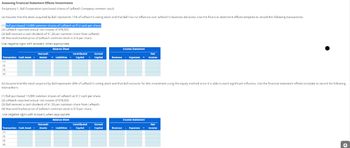
FINANCIAL ACCOUNTING
10th Edition
ISBN: 9781259964947
Author: Libby
Publisher: MCG
expand_more
expand_more
format_list_bulleted
Question
Don't give answer in image format

Transcribed Image Text:Assessing Financial Statement Effects Investments
On January 1, Ball Corporation purchased shares of Leftwich Company common stock.
(a) Assume that the stock acquired by Ball represents 15% of Leftwich's voting stock and that Ball has no influence over Leftwich's business decisions. Use the financial statement effects template to record the following transactions:
(1) Ball purchased 10,000 common shares of Leftwich at $12 cash per share.
(2) Leftwich reported annual net income of $70,000.
(3) Ball received a cash dividend of $1.20 per common share from Leftwich.
(4) Year-end market price of Leftwich common stock is $19 per share.
Use negative signs with answers, when appropriate.
Balance Sheet
Transaction Cash Asset +
(1)
(2)
(3)
(4)
Noncash
Assets = Liabilities
Transaction Cash Asset +
(1) Ball purchased 10,000 common shares of Leftwich at $12 cash per share.
(2) Leftwich reported annual net income of $70,000.
(3) Ball received a cash dividend of $1.20 per common share from Leftwich.
(4) Year-end market price of Leftwich common stock is $19 per share.
Use negative signs with answers, when appropriate.
Balance Sheet
(1)
(2)
(3)
Contributed Earned
Capital + Capital
Noncash
Assets
(b) Assume that the stock acquired by Ball represents 30% of Leftwich's voting stock and that Ball accounts for this investment using the equity method since it is able to exert significant influence. Use the financial statement effects template to record the following
transactions:
- Liabilities +
Revenue
Contributed Earned
Capital + Capital
Income Statement
Revenue
Expenses =
Net
Income
Income Statement
Net
Expenses Income
↑
Expert Solution
This question has been solved!
Explore an expertly crafted, step-by-step solution for a thorough understanding of key concepts.
This is a popular solution
Trending nowThis is a popular solution!
Step by stepSolved in 2 steps

Knowledge Booster
Similar questions
- Select the letter of the item below that best matches the definitions that follow. a. Data Files CD ________ b. Lists ________ c. Forms ________ d. Registers ________ e. Reports and graphs ________ f. Restoring a backup ________ g. Icon bar ________ h. Home page ________ i. Backing up a file ________ 1. One click access to QuickBooks Accountant Centers and Home page. 2. The process of rebuilding a backup file to a full QuickBooks Accountant file ready for additional input. 3. Electronic representations of paper documents used to record business activities such as customer invoices, vendor bills, and checks. 4. A big-picture approach of how your essential business tasks fit together organized by logical groups such as customers, vendors, and employees. 5. Groups of names such as customers, vendors, employees, items, and accounts. 6. Contains backups of all the practice files needed for chapter work and completion of assignments. 7. The process of creating a copy of a…arrow_forwardPlease do not give image formatarrow_forwardPlease don't provide handwrittin solution....arrow_forward
arrow_back_ios
SEE MORE QUESTIONS
arrow_forward_ios
Recommended textbooks for you

 AccountingAccountingISBN:9781337272094Author:WARREN, Carl S., Reeve, James M., Duchac, Jonathan E.Publisher:Cengage Learning,
AccountingAccountingISBN:9781337272094Author:WARREN, Carl S., Reeve, James M., Duchac, Jonathan E.Publisher:Cengage Learning, Accounting Information SystemsAccountingISBN:9781337619202Author:Hall, James A.Publisher:Cengage Learning,
Accounting Information SystemsAccountingISBN:9781337619202Author:Hall, James A.Publisher:Cengage Learning, Horngren's Cost Accounting: A Managerial Emphasis...AccountingISBN:9780134475585Author:Srikant M. Datar, Madhav V. RajanPublisher:PEARSON
Horngren's Cost Accounting: A Managerial Emphasis...AccountingISBN:9780134475585Author:Srikant M. Datar, Madhav V. RajanPublisher:PEARSON Intermediate AccountingAccountingISBN:9781259722660Author:J. David Spiceland, Mark W. Nelson, Wayne M ThomasPublisher:McGraw-Hill Education
Intermediate AccountingAccountingISBN:9781259722660Author:J. David Spiceland, Mark W. Nelson, Wayne M ThomasPublisher:McGraw-Hill Education Financial and Managerial AccountingAccountingISBN:9781259726705Author:John J Wild, Ken W. Shaw, Barbara Chiappetta Fundamental Accounting PrinciplesPublisher:McGraw-Hill Education
Financial and Managerial AccountingAccountingISBN:9781259726705Author:John J Wild, Ken W. Shaw, Barbara Chiappetta Fundamental Accounting PrinciplesPublisher:McGraw-Hill Education


Accounting
Accounting
ISBN:9781337272094
Author:WARREN, Carl S., Reeve, James M., Duchac, Jonathan E.
Publisher:Cengage Learning,

Accounting Information Systems
Accounting
ISBN:9781337619202
Author:Hall, James A.
Publisher:Cengage Learning,

Horngren's Cost Accounting: A Managerial Emphasis...
Accounting
ISBN:9780134475585
Author:Srikant M. Datar, Madhav V. Rajan
Publisher:PEARSON

Intermediate Accounting
Accounting
ISBN:9781259722660
Author:J. David Spiceland, Mark W. Nelson, Wayne M Thomas
Publisher:McGraw-Hill Education

Financial and Managerial Accounting
Accounting
ISBN:9781259726705
Author:John J Wild, Ken W. Shaw, Barbara Chiappetta Fundamental Accounting Principles
Publisher:McGraw-Hill Education